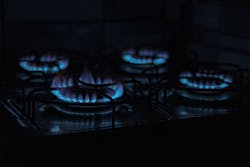If you think that all-electric homes are too cutting edge for your buyers, Panama Bartholomy has a message for you. “Over half all homes built over the last four decades across America use electricity for their water heating and their space heating,” said Bartholomy, citing statistics from the most recent American Housing Survey. “This is not novel Jetsons or Star Trek technology. This is happening all over the country.”
Bartholomy, the executive director of the Building Decarbonization Coalition, made his remarks during his online presentation at Healthy Home 101, an online event hosted by the newly launched Healthy Home Alliance. During his talk, he shared a number of reasons why builders should start building electric homes now—and how to bring their buyers with them.
“Start planning now about how you can adjust your designs, find space for that heat pump and that water heater, and start to work with us on how to sell induction cooking, because there’s going to be money on the table,” Bartholomy advised. “But it’s only going to be there for the people that are at the front of the line… not for the people who waited until the end.”
Why Builders Should Construct Electric Homes Now
You may be on borrowed time for gas-fired homes.
Many localities have begun banning natural gas in new construction. Bartholomy recalled comments made by a Pacific Gas and Electric Company (PG&E) official who said the company would support localities such as Berkeley, Calif., that didn’t want to add natural gas connections.
“It was really groundbreaking commentary from a representative of the fourth largest distributor of natural gas in the country, and a key partner to anybody that builds in Northern California, saying we don't want to extend gas to your project anymore,” Bartholomy said, adding that 46 other California cities as well as Seattle, Denver, and New York City have made similar decisions about natural gas connections in new construction.
Electric homes are healthier, according to researchers who study indoor air quality.
Unlike emissions from a furnace, water heater or dryer, “we’re not doing as good of a job getting [noxious fumes] out of buildings when it comes to cooking,” Bartholomy noted. He pointed to research by Dr. Brett Singer at Lawrence Berkeley Laboratory, whose team found that cooking with gas exposed people to unhealthily high levels of carbon monoxide, formaldehyde, and nitrogen dioxide.
“People were being exposed to illegal levels of toxic fumes inside their homes, but there was nothing that can be done about it, because it was coming inside homes rather than coming from a power plant or an industrial facility,” Bartholomy said.
Going all-electric will save money now and later.
By skipping the gas connection fee and installing gas lines in the home, builders can save thousands of dollars that they can then invest in appliances that overcome buyer resistance to electric homes. In addition, the 2022 California building code will expect “electric readiness,” according to Bartholomy.
“This is going to be the first code ever to recognize the implicit dangers of cooking with gas by requiring the higher ventilation standard for putting in a gas stove into new designs that use an electric, so you're going to have to have a more expensive ventilation system to put a gas stove into your home... People that are still going to be building with gas are going to be leaving tens of thousands of dollars on the table.”
You can build a more energy efficient home by going all electric and installing a heat pump.
“You have an incredibly efficient way to be able to heat and cool space that outpaces even a 'best in class' gas water heater or gas furnace," according to Bartholomy.
RELATED: How Popular Are Heat Pumps in New Homes?
How to Convince Home Buyers to Choose Electric Homes
Of course, it’s one thing to build an electric home; it’s quite another to market and sell those electric homes effectively and profitably.
“We did a major study of home builders in California and the readiness to look at electrification, and they brought up cooking as the biggest challenge,” Bartholomy notes. “And not even cooking so much as a technology, but more customer perception about cooking,” particularly when it involves electric stoves. “They are afraid if a customer came into a house and saw an electric stove, they would immediately have a poor reaction and make a $600,000 decision based on a $1,200 piece of technology.”
Those builders’ concerns are justified. According to a 2021 study by Morning Consult, 50% of buyers who said they were unlikely to buy an electric stove said it was because of previous poor performance with electric stoves.
So what can builders do to persuade buyers to go for an electric home? Here’s what Bartholomy suggests:
Address buyers’ spoken or unspoken concerns about cooking.
“I want to assure you that when we’re talking about the future of electrified homes, we're not talking about the old resistance coils,” he said. “We're talking about magnetic induction cooking, which is truly the Tesla of your kitchen.” He pointed to a study by the Sacramento Municipal Utility District and PG&E’s Food Service Technology Center in San Ramon, Calif., which compared glass, coil, induction, and gas cooktops for boiling water (“basically four children’s worth of pasta water,” Bartholomy said) and found that induction offered the most power and the most control to cook.
“It's fast, flexible, super efficient, super controllable, and incredibly safe,” he added.
Neutralize buyers’ pocketbook concerns by pointing out the total savings of avoiding gas.
A California Building Industry Association study in 2018 found that electric appliances, heat pumps, and induction stoves were about the same or cheaper than gas appliances when used for new construction. Combine those figures with the savings of no gas infrastructure and no additional gas-related ventilation requirements, and “you’re looking at a marginally cheaper building for building all electric in California,” Bartholomy said.
Explain that an electric home is also a healthy home.
As Bartholomy and others have noted, gas cooking can create surprisingly unhealthy indoor air. For buyers who either have asthma themselves or children with asthma, indoor air quality is a real concern—and IAQ can be improved with an electric kitchen.
Just this year, researchers at the University of Australia released a report that suggested that gas stove emissions can be as harmful to children’s lungs as growing up in a household with someone who smokes, according to Bartholomy.
“We're starting to have a growing body of research that shows that the air quality issues of cooking with gas are significant for children in particular,” he added.

